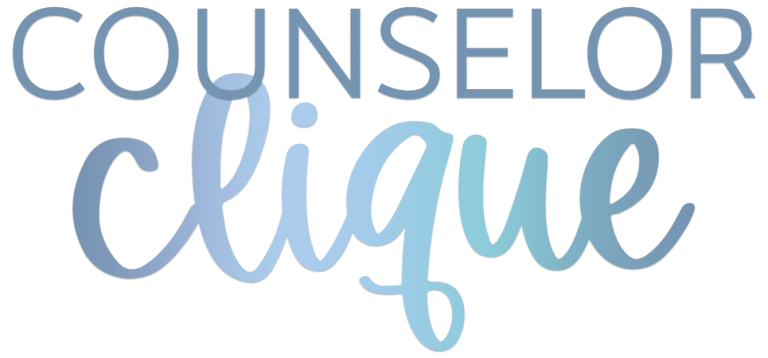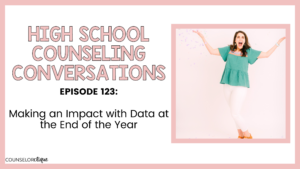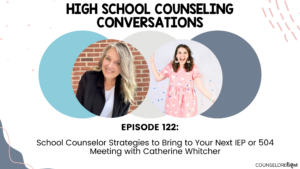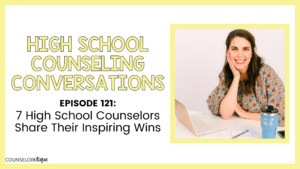
Here's What to Expect In This Episode:
As school counselors, we often find ourselves reacting to emergencies rather than proactively helping our students. But what if I told you that your work calendar could be the key to shifting from a responsive service to a proactive one?
Inside this episode, I’m sharing how my counseling team and I used our digital calendar to collect data and advocate for changes in our department. With these changes, we were able to get a better handle on how we were spending our time. This allowed us to plan ahead and even advocate for changes like running small groups and doing classroom lessons on topics that students truly needed.
The key takeaway? Don’t underestimate the power of your work calendar. It could be one of your greatest advocacy tools! By collecting calendar data and examining your time, you can create a stronger case for the things you want to be doing and advocate for your role as a school counselor.
I hope this conversation encourages you to take a look at your current systems and ask yourself, is it working for you? And if not, consider making some changes to play the long game with data and strengthen your role in your school.
Topics Covered in This Episode:
- A reminder that compelling data doesn’t have to be complicated
- What kind of data I gathered from a simple check-in system (and how this system was set up!)
- Suggestions of what you can do if you feel like you’re losing control of your calendar
- How collecting data and examining your time as a high school counseling team can change your administrator’s perspective of your role
- The importance of being intentional with collecting your your calendar data to revolutionize your counseling program.
Resources Mentioned in This Episode:
Other Blog Posts You Might Like:
Read the transcript for this episode:
You’re listening to Episode 78 of High School Counseling Conversations. This episode is airing for the first time at the end of the school year, which I feel like it’s a good time to pause and re examine what you’re doing and why you’re doing it. Especially in case you are thinking it might be time to shake things up.
In this episode, I’m going to challenge you to think about how you’re using your work calendar right now. Do you have a strong system in place? Is it something that’s working for you? Now I know there can be some strong opinions out there about advocacy in general.
Why do we need to advocate for our job or our role? Why do we have to tell people what we do over and over again? Why does the title school counselor versus guidance counselor actually matter? And maybe we should do an entire episode on that? Yes, noted, check. I’m adding it to the list.
But let’s go into this episode assuming that we’re cool with advocating. We understand it’s something that we can and we should do to strengthen our role in our schools. We agree that we feel good about school counselor advocacy.
Okay, moving on. Is your calendar currently functioning as just something helping you keep your head above water so that you don’t drown? Or have you ever thought of how your calendar could be used as an advocacy tool. Let’s get into it in this week’s episode.
You got into this profession to make a difference in your students lives, but you’re spread thin by all the things that keep getting added to your to do list. I can’t create more hours in the day, but I can invite you into my Counselor Clique where you’ll finally catch your breath. Come with me as we unpack creative ideas and effective strategies that will help you be the counselor who leaves a lifelong impact on your students. I’m Lauren Tingle, your high school counseling hype girl. Here to help you energize your school counseling program and remind you of how much you love your job.
For the sake of this episode, I’m also going to assume you’re using a digital calendar because that can be a bit easier to tally, total, and share out to increase your advocacy efforts. I’ll link to some other podcast episodes and blog posts all about calendars and time management in the show notes in case you want some more specifics in this realm.
I want to walk you through how collecting calendar data and examining our time as high school counseling team, change our administrators perspective of our role, and help us advocate for the things we wanted to be doing and the things that we should have been doing.
When you intentionally plan and use your calendar in your high school counselor role, it’s possible to have positive outcomes. Now, these aren’t magic solutions that happen overnight. But it’s also not a waste of time either. So I want to reassure you that.
These things are the results of putting in time getting into some rhythms and then you’ll have results to show from it. You’re playing the long game here with data. I’m talking at least a semester maybe a whole school year. When I interviewed a former principal of mine in Episode 71, our calendar usage and data collection is something that still sticks out to him and his mind as a pivotal moment in how we change a lot of our roles and responsibilities as a team.
After my department collected some data from our calendars, and from our digital checking system, we crunched some numbers, we shared those with him and he agreed it was time to take our services from responsive to proactive. Administrators may start listening to you if you have some compelling data to share with them. Yes, I know this is the best case scenario. But it is tough to argue with data. And administrators love data. So let’s give them what they love.
Oh, and a reminder, compelling data does not have to be complicated. I’m going to share with you the exact step by step that shifted our departments model for the better. We were feeling overwhelmed that our model felt more like emergency responder services, then a space where we proactively taught and serve students. Yes, we will always have responsive services as part of our role. But our data was showing it was so skewed. We were never getting ahead on what we wanted to be doing in our school, because everything was on fire all the time. I don’t know if you can relate to that or not.
First, we looked at our checking system. Let me tell you, it was basically just a spiral notebook where people, students, parents, wrote their name in it sitting in our lobby. Now, if you know me, I’m a pusher of the status quo. One of my strengths on the Strengths Finder assessment is Maximizer meaning I like to take something and make it better. Transforming something is just thrilling to me. I’m being serious.
Yes, I’m about to tell you how transforming our program to proactive was absolutely thrilling to me. Well, I looked at that notebook and I thought why the heck are we doing that? What is the point of that notebook sitting right there? I mean, I’m sure somebody meant well who put it there? I guess maybe we would know who came by our office but then what it literally just sits in a notebook for all eternity fills up and then goes in the trash can. No thanks. That doesn’t make any sense to me.
I definitely had to spend some time figuring this out. But I got a computer for our lobby like I may that happened. I got a Google Form to open on it every day. And it was simple. We also use this computer to have forms for signups that were currently happening with our school counseling department. We also had our school counseling website pop up on there, too.
Now, we didn’t use this sign in forum to alert us that a student was waiting for us in the lobby. But I guess you could do that. We didn’t use it for behavior issues like making sure a student was in our office when they said they were, though I guess you could do that, too. We were using it for data collection. And remember I said it was simple. Here’s how simple it was. This is what the Google Form said.
We were asking for first name, last name, student’s grade. Then we asked what counselor you’re here to see. Because at this point, we had a counselor that rolled with each class plus a director who often saw off grade level students, plus a college and career counselor. So we were just curious who people were popping in to see.
Then we had a question that said, I am a student or a parent. I mean, I guess that’s the statement they’re selecting if they’re a student or a parent. Then what do you need help with today? And the options were academic concern, college career planning, personal social concern, or IGP meeting.
Sidenote, and IGP meeting in our area, that acronym stands for individualized graduation plan meeting. It’s like your required graduation planning meeting for the year that usually a parent and student come in together for.
And then lastly, do you have a scheduled appointment? And those options? Were yes or no, I’m just dropping in. So seven questions total, super simple. But getting closer to collecting some data that we were curious about.
So what did our data show from the sign in? Forgive me, I can’t remember if this was one semester or all school year long, it was a long time ago. But the data point was so simple and so compelling. And honestly, it’s exactly what we were looking for.
We found that 81% of people coming in did not have an appointment. So what did that mean for us? And meant that our time was heavily reliant on responsive services. We were constantly dropping what we were doing to respond to minute concerns and crises.
Yes, I said from the beginning, these are to be expected in part but our team was in agreement that we didn’t want to be flying by the seat of our pants all the time. It really makes you feel scattered when you live in that world. Like you’ve never actually got anything done because you were interrupted all day. ‘
We were all feeling the tension of losing control of our calendars. And when we have lofty visions of being a ramp program that serves students well, we had goals that we wanted to achieve. We knew we couldn’t keep taking one step forward and two steps back if we wanted to meet those expectations we had for ourselves and our program.
This episode is brought to you by the high School Counselor Kickstart Audio Course. Did you score a job as a new high school counselor? Did you celebrate? And then pause and wonder, okay, what do I do now? Well, I have the keys to your new counselor kingdom right here in an eight episode private podcast. In 90 minutes or less, if you’re listening on two times speed, you’ll have the roadmap to new counselor confidence that you’re looking for. Check out everything that’s inside, including two amazing exclusive bonuses at counselorclique.com/newcounselor. Now back to the show.
Because it was part of the ramp journey anyways, ramp being a Recognized Aska Model Program, that national award that we were after for the transformation of our program. We all started color coding our calendar and tracking where we spent our time individually. Yes, this takes time to pull and compile the data from this. But getting into the habit of collecting it in the first place is the first big step.
If you want to use it for data purposes and dig deeper to answer your big questions, then at least you have to have the option to have it there. So we had the office check in and our personal calendars to compile. Internally in our office, we knew we wanted to get more efficient with how students were scheduling meetings. So I’m a broken record about this, but I’m a huge advocate for Calendly, an appointment system that syncs with your digital calendar. So you do have to be using a digital calendar to make this run smoothly.
I’ll link to Calendly in the show notes because it’s free and easy to use and just plain awesome. So remember, one of the questions was Do you have an appointment? We knew that if we wanted more proactive measures, we had to offer opportunities to make appointments and blast that out everywhere.
Teachers needed to know how to tell their students how to make appointments and those links needed to be accessible. We put our links in our email signatures and on our websites. We added QR codes in the lobby by our names. We had a website open on that computer in the lobby to our Calendly so that students or parents can make appointments there too. We responded to emails about setting up meetings with that link. We didn’t just tell them to drop it. We seriously had to train the people but it was worth it.
As we started getting a handle on who was coming in and when we were able to get tasks done when we said we would. We were better able to plan ahead of time for classroom lessons. and larger scale events like career fairs, and we were finally able to run small groups. We felt less scattered and more satisfied in our roles. We were doing counseling in less of an emergency room situation, but more of a doctor’s office role, like, does that make sense? I’m not saying we’re doctors. I’m just saying everything was just so much more controlled.
Don’t get me wrong, my To Do List constantly stayed full. Things always rolled over to the next day. But I was no longer getting to the end of the day saying, what the heck did I get done today? I could see on my digital calendar exactly what was getting done. And when we could see where our time was going, we were able to go to our principal and make big asks like, can you take away testing so that we can run small groups at this time of year, or look at the percentage of students dropping in for social emotional concerns, weneed to get ahead of this and get into the classrooms.
He then had no problem advocating on our behalf to teachers to use that instructional time for us to do classroom lessons on topics that we knew students needed, because our data from our office dropins, and our annual needs assessments showed it to be true. And like I said, it’s tough to argue with data.
When we’re intentional with our calendars and use them to collect data, we can revolutionize how our program flushes out. With a few small tweaks and intentional changes, you may find yourself in a goldmine of information that changes your next steps or the future of your department.
Thanks for tuning into this week’s episode. If you listened to this and thought, hey, we need to make some changes in our department. Would you do me a favor? Hit the share button and text this episode to a co counselor who you work with? It’d be so cool for me to hear about the ways that you’re examining the way you do things and how you shake things up after listening to this episode of High School Counseling Conversations. So share this episode with a friend and I’ll see you here next week.
Thanks for listening to today’s episode of High School Counseling Conversations. All the links I talked about today can be found in the show notes and also at counselorclique.com/podcast. Be sure to hit follow wherever you listen to your podcast so that you never miss a new episode. Connect with me over on Instagram. Feel free to send me a DM @counselorclique. That’s C L I Q U E. I’ll see you next week.
Connect with Lauren:
Cheers + Happy Listening!
Like what you’re hearing? Follow and leave a review on Apple Podcasts. It helps other high school counseling friends find it!
Can’t contain your excitement? Share the pod! Tell a friend! Your word-of-mouth referrals mean the world to me!






